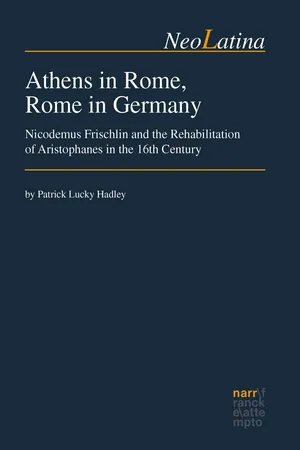
Athens in Rome, Rome in Germany
Nicodemus Frischlin and the Rehabilitation of Aristophanes in the 16th Century
- 185 pages
- English
- PDF
- Available on iOS & Android
Athens in Rome, Rome in Germany
Nicodemus Frischlin and the Rehabilitation of Aristophanes in the 16th Century
About this book
The bawdy comedies of Aristophanes gradually began to attract more attention among learned circles in the later 16th century. This trend culminated in 1586, when Nicodemus Frischlin produced new and strikingly original Latin versions of five plays by Aristophanes. With this work Frischlin completely recast the place of Aristophanes in the Republic of Letters, forcing readers to approach him as a dramatist of tremendous contemporary relevance. Frischlin was able to rehabilitate Aristophanes by calling attention both to the practical advice his plays could give on the administration of a res publica, and to the light they could shed on serious problems concerning rhetorical education and political discourse within the troubled Holy Roman Empire under Rudolf II. This work aims to restore Frischlin's translations to their rightful place of honor within the broader reception tradition of Aristophanes and Old Comedy, while analyzing them within the context of Frischlin's own longstandingcampaigns for educational and political reform.
Frequently asked questions
- Essential is ideal for learners and professionals who enjoy exploring a wide range of subjects. Access the Essential Library with 800,000+ trusted titles and best-sellers across business, personal growth, and the humanities. Includes unlimited reading time and Standard Read Aloud voice.
- Complete: Perfect for advanced learners and researchers needing full, unrestricted access. Unlock 1.4M+ books across hundreds of subjects, including academic and specialized titles. The Complete Plan also includes advanced features like Premium Read Aloud and Research Assistant.
Please note we cannot support devices running on iOS 13 and Android 7 or earlier. Learn more about using the app.
Information
Table of contents
- Cover
- Impressum
- Contents
- Acknowledgments
- A Note on Orthography and Translation
- Chapter I Introduction
- Chapter II Translation Theory and Translation as Interpretation in Frischlin’s Aristophanes
- Chapter III Education and Rhetoric in Frischlin’s Translations
- Chapter IV Nationalism and the Politics of the Holy Roman Empire in Frischlin’s Translations
- Chapter V The Reception of Frischlin’s Aristophanes
- Chapter VI Conclusion
- Bibliography
- Index